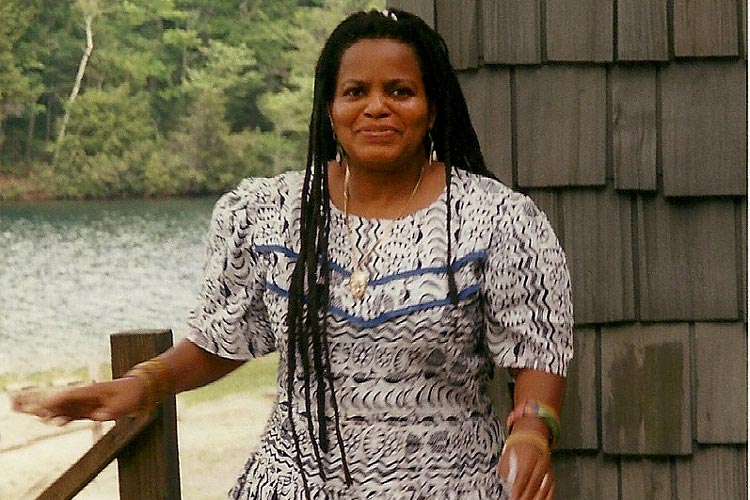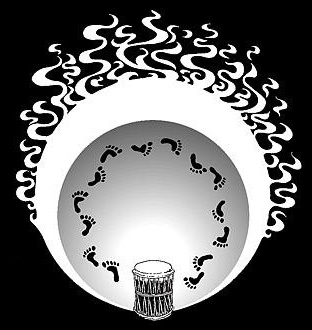
Marilyn Middleton-Sylla Interview
By Rachel Messer
Spring 2000
Marilyn Middleton-Sylla is the director of Bamidele Drummers and Dancers, a company that presents concerts, lecture demonstrations, workshops and classes of African dancing and drumming for K-12th grades, colleges, Universities, and theatres throughout New England and the United States.
Also, she teaches African dance from a cultural perspective at Mt. Holyoke since 1994 and Greenfield Community College since 1993. Since 1987 she has taught and performed throughout New England and the United States including Jacobs Pillow, the Omega Institute in Rhinebeck, New York and Kripalu Center in Massachusetts. In addition, she has performed in Senegal, West Africa. Often she returns to Africa to continue her studies of African dance and music.
Do you specialize in both drum and dance?
I am able to play drums. I am a professional dancer and dance educator but I am also a musician.
How many years have you been performing?
I’ve been teaching and performing professionally since 1987.
Where did you grow up?
My father was in the airforce so I grew up travelling all over. I lived all over the United States. I also lived in Canada and Japan.
Did you grow up around dance?
What made you decide to dance?
I’ve always been active physically. I was a cheerleader in the pep squad, on the track team, softball… I’ve always grown up with those kinds of things. As an adult in my early twenties I took my first dance class in Colorado in 1979 and I just got hooked. I loved it. It wasn’t until ’83 that I started seriously studying Africa and African rooted dance.
What does African dance involve?
I specifically mean dance from Africa, West Africa, the Caribbean, and Brazil.
Could you describe how a performance looks?
If we’re performing for a school we have two dancers and two drummers. We talk a little bit about the dance and we open with a musical, a drum call, where all the dancers and the musicals are playing something. Then we usually do a welcome dance called Afunga, and we teach this to our audience, which is usually primarily grades K through 12. And then we do some Caribbean dance and explain what that is about, and then some Yanvalou and Ibo, which are dances of Nigeria and Liberia. And we have a song that we teach the kids, and then we have the dance. We explain what the movements mean. In African dance the movements all mean something, they tell a story. Then we explain Yanvalou and Ibo.
You know, people were very strong people when they came to the Caribbean. A lot of them chose to walk into the water and drowned themselves, and others escaped and started their own village there on the island. Then we do a little bit of Brazilian dance, a little bit of samba, and then we do a little audience participation. Most of our work is down with young people. We do a school performance every Monday and Tuesday for kids in Massachusetts.
Where did you study African culture?
I studied in Africa, in Senegal. I studied in Gambia, Casamance, and Guinea. I also studied with master dancers in New York and Boston.
Is there any particular reason you teach
at all-woman colleges?
No, only because they want me to teach there.
When you teach those classes are they mostly participation in dance or reading?
We watch one or two videos during the semester, and they usually have to write one paper. And then it’s mostly studio time.
In our class this year, we touched on the relationship between the drummer and the dancer, and I was curious to know your experience as a dancer with that: how they play off each other, who is leading, etc?
In African rooted dance the dancer and the drummer are one. You don’t have the dance without the musicians. That’s why it’s so important while teaching African dance, if at all possible, to have live musicians. Because a drummer talks to a dancer with their drum. He can tell a dancer to start moving, change to another movement, stop, all by a signal on the drum. The drummer can strap his strap on and follow the drummer around the stage. It’s inseparable. In Africa if you say "Come on, I want to dance," you mean dance, rhythm, song. It’s all one. Any dance they have in Africa, there’s a specific rhythm that goes with it, they’re all one.
Is the dancing in Africa the same in most parts
or very different?
Yes, it’s very different. Instruments change, clothing changes. In different parts of Africa they’ll have different names for the same dances. They call it bandani in Guinea, and in Senegal they’ll call it domba. The way they move in South Africa, the way they move in East Africa, the way they move in West Africa – it’s all different. The way they dance in Ghana is different. The movements are very subtle, a movement of their lower body. As far as Guinea, Senegal, and Mali, there’s high energy dancing with jumping that you won’t necessarily see if you’re studying dance from Ghana. East Africa is different. It’s all very different and that’s why when I say I won’t say I’m teaching African dance, I’ll say I’m teaching African dance from Ghana or from Senegal or from Guinea so that it’s very clear.
When do people dance in Africa?
Dance is part of the culture and they dance for different reasons. There are dances for rights of passage, birth, healing, harvest, when people are working in the fields to give the workers for support. People dance for all different reasons and there are some places in Africa where they don’t dance, where they only dance for special, religious occasions.
Do you use djembes in your performance?
Yes, when we are doing African drumming we use djembes. When we’re doing Caribbean and Brazilian we have congas and surdos, bass drums. We also use jun-juns and dun-duns and songban and dawoda bells and shekeres.
When you are teaching do you have live drummers?
Yes. I pay to have drummers come because we always have live drumming. The importance between the connection between the dancer and the drummer is essential for the students to understand.
Does the dancer ever take over in the relationship with the drummer?
Of course, it goes both ways. It’s a partnership.
Do the women usually dance and the men drum?
Generally the men drum and the women dance. In my company we have a piece where the men dance and the women drum. All women play percussion. The djembe drum in Africa is not played by women, that’s only here and in Europe. In Africa the women don’t play the djembe, they play the jun-juns, they play the bass drums, they play the small percussion, they play kirini – a long wooden drum – or the boogala boo drums, or the sabar drums in Senegal, but women don’t play the djembe.
In our class we discussed cultural sensitivity and the use of the djembe or other African drums without knowing the traditions behind them. How do you feel about people in America using a drum in which they are ignorant of its original use?
Well, I think it’s important that people do more than just sitting behind a drum and start banging on it. But it’s offensive, too, if someone sits behind a piano and starts banging on it. To a certain degree that’s okay – to want to discover and to want to learn. But I think it’s important that people study, that they study drumming, so that people understand the background and some of the history of every drum they’re playing. It’s not offensive to me. I know there’s a lot of people who do organic drumming where they sit behind a drum and they just want to play it, and that’s fine. I have no issue with that at all. I just think it’s important, for themselves, to understand what they’re doing and understand a little the people who do it and who brought it over so that we don’t forget… particularly with anything that’s African rooted. Years ago African and black people were not permitted to drum and dance. When African people were first brought over here all that was taken away from them. So I think it’s very important that when they’re drumming they understand that there were people who couldn’t do this! To drum they had to makeshift. They drummed with their feet on the hard floors and on their pots and pans to keep their culture alive.
Are all the performers in Bamidele African?
They’re African or African descent.
How would you feel if someone who wasn’t African or of African decent wanted to join Bamidele?
My company has always been of people who are African and African descent and that’s always how it’s been set up. My students are predominantly European or non-African, and that’s fine. Everyone has a right to study anything that they want… especially other cultures. But for myself, when I’m presenting African dance and African music I prefer to use people of African descent.
Do your children drum?
I have a two and a half-year-old son and he’s an incredible drummer. I also have a nine-year-old girl.
Do you make your costumes?
I get them made; I have an incredible tailor. We bring our fabric.
I’m curious to know what kind of feeling you get when you dance, you personally?
When I’m dancing I’m almost in a trance. I’m in another world. I’m real in another world. If the music is good, and the drummers are all connecting with one another, there’s just an energy that flows between dancers and drummers that just is incredible. It’s hard to understand it’s hard to explain it. It’s like receiving the Holy Ghost or something. I don’t know if you’ve ever been to a Baptist church or holiness church where the people are shouting and feeling the spirit. It’s the same thing with dancing for me. If the drums are right, it’s the same thing. I feel as if I’m transported somewhere else and for those moments where I’m dancing I feel no pain. I have incredible energy, and I can forget everything that’s going on around me. I can just get on top of the rhythm and ride it. When the music is right and the dancers are really connecting with the music we can dance for hours and not feel any pain. It’s different if there are just a bunch of people beating on drums. If there are musicians that know the rhythms and can mark the movements that we’re doing, it’s just incredible. It’s my high. You hear runners talk about the runner’s high? Well it’s the same thing for me when I’m dancing. There’s a wall that you go over and you keep going.
Do you dance with natives when you’re in Africa?
Do you participate with their ceremonies?
No. I hire drummers and dancers to give me private lessons. I study with different dance companies there. When they have big parties sometimes everyone makes a big circle and dancers will go out and do a move. I participate in that. But strictly ceremonial dances are for people of that culture and I wouldn’t be invited to do certain dances.
Is there anything else you would like to tell me?
You should check out the website and you can check dates for our next performances.
